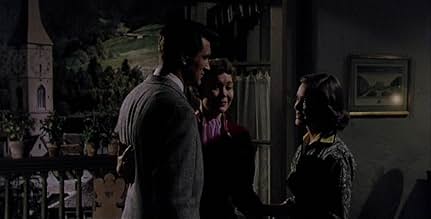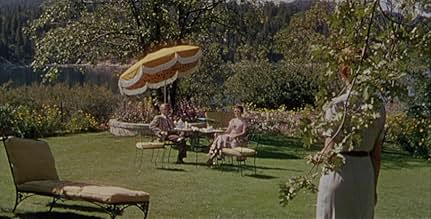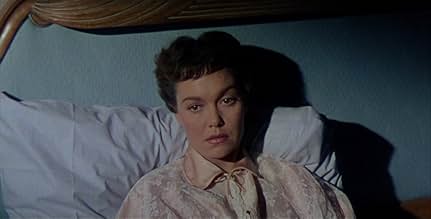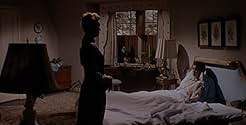NOTE IMDb
7,0/10
8,1 k
MA NOTE
Un playboy égoïste amoureux d'une femme qu'il semble faire souffrir plus qu'il voudrait commence à réfléchir sur le sens plus profond de leur relation.Un playboy égoïste amoureux d'une femme qu'il semble faire souffrir plus qu'il voudrait commence à réfléchir sur le sens plus profond de leur relation.Un playboy égoïste amoureux d'une femme qu'il semble faire souffrir plus qu'il voudrait commence à réfléchir sur le sens plus profond de leur relation.
- Réalisation
- Scénario
- Casting principal
- Nommé pour 1 Oscar
- 2 victoires et 1 nomination au total
Joseph Mell
- Dan
- (as Joe Mell)
Avis à la une
romanticism. Rock Hudson in one of his most interesting roles. drama and flavor of soap opera and fragments from atmosphere of a lost time. a film about true love against mistakes and errors from past and illusions. sure, not a great one but perfect for the admirers of the director and actors and as refuge in a pink place. but Magnificent Obsession has the gift to be more than a nice movie. but the occasion for discover the art of Jane Wyman and Rock Hudson to explore the details of roles in wise manner. to say a great story about the second chance. and, sure, about the force of love. so, in strange manner, a memorable film. fascinating, sure, first for the performances of the lead actors.
Bob Merrick (Rock Hudson) gets his commuppance and learns to be not such a reckless rich twat, with the help of a fairy godfather and falling in love with a woman he made go blind!
If you've never heard of Douglas Sirk, be prepared that this will be melodrama city. Production values are superb, though. Sirk was a very talented craftsman, as well as creating a beautiful aesthetic for these films.
Sirk made the hospital and the classic American home look as artificial and sanitised as he could: with lipstick so bright and full the lips jump off the faces, sculpted hair and good looks, everything in its right place and colours so stark it looks like a children's colour book. These locales are contrasted with a couple of other places, darkly beautiful: the scene where Rock is sitting at a bar, which starts with the rather loose and drunk looking woman leaning up against the wall, with curls of cigarette smoke and beautiful light in the background. The other is the night scene in Paris, with such exquisite light coming through the doors of the apartment.
Rock is actually pretty good in the film, and really perfect looking. I can see why Sirk picked him out - he's a Ken doll - playing the fantasy American: rich, beautiful and devil-may-care. And after this flick, he was also a star.
3/5. I liked La Habanera better, though.
If you've never heard of Douglas Sirk, be prepared that this will be melodrama city. Production values are superb, though. Sirk was a very talented craftsman, as well as creating a beautiful aesthetic for these films.
Sirk made the hospital and the classic American home look as artificial and sanitised as he could: with lipstick so bright and full the lips jump off the faces, sculpted hair and good looks, everything in its right place and colours so stark it looks like a children's colour book. These locales are contrasted with a couple of other places, darkly beautiful: the scene where Rock is sitting at a bar, which starts with the rather loose and drunk looking woman leaning up against the wall, with curls of cigarette smoke and beautiful light in the background. The other is the night scene in Paris, with such exquisite light coming through the doors of the apartment.
Rock is actually pretty good in the film, and really perfect looking. I can see why Sirk picked him out - he's a Ken doll - playing the fantasy American: rich, beautiful and devil-may-care. And after this flick, he was also a star.
3/5. I liked La Habanera better, though.
I am a Douglas Sirk devotee and regard him as one of the screen's more underrated directors. Having said that, I regard "Magnificent Obsession" as a bit much, even for Sirk. I like Sirk because, even though he is a master of soapers, he is more than that. His films contain social commentaries that are often biting, and they often contain good character studies. In this preachy film the social commentary is absent and the characters are one dimensional. But I can forgive all this because the acting is good--Wyman, Kruger, and Moorhead are excellent--and Sirk showed that Rock Hudson could act if properly directed. This was Hudson's breakthrough film. But the music is almost too much to bear! I have never heard such wretchedly maudlin, and loud, movie music in my life. The heavenly choruses in the background are shameless. In spite of all this, however, it is all quite entertaining. 7/10
Looking back on the abbreviated career of Douglas Sirk, "Magnificent Obsession" rises above being just another "woman's film" or "weepie". It actually serves as a notable turning point as it is the first in a string of Technicolor melodramas Sirk helmed at Universal-International, as well as one of his most popular. It also kick-started the malnourished career of Rock Hudson and sent his fame into another realm. Despite the film's lame-brained premise and endless implausibilities, Sirk takes the material and dishes out a sweet, moving drama that is a thinly disguised tale of Christianity.
Hudson stars as Bob Merrick, a millionaire playboy with no cares in the world. His lavish and self-serving lifestyle inadvertently leads to the death of a prominent local doctor, Wayne Phillips. Dr.Phillip's widow, Helen(Jane Wyman)tries to pick up the pieces of her shattered life, while at the same time resisting the advances of Bob Merrick. His persistence results in an accident in which Helen goes blind. In a convoluted and corny twist, Bob tries to redeem himself by giving selflessly to others and devoting his life to medicine to find a way to restore Helen's eyesight.
Every stereotype of every soap opera convention is used in overwhelming doses to tell the story of "Magnificent Obsession". The "alternative lifestyle" of Christianity that Bob learns is a mish-mash of psychobabble that even the most detail-oriented viewer would find boring and confusing. And the seriousness in which the actors take the material is eye-rollingly unbelievable. But this film is saved by the always-savvy direction of Douglas Sirk(who himself hated the plot)and an elegant, understated Jane Wyman who brought her own brand of sophistication to every role she played - and was Oscar-nominated for this role. Even Hudson is able to overcome his nerves in his first leading, A-list role to give a performance that is convincing. Sirk's use of reflective surfaces and a dominating color palette give this movie a look that is undeniably sheen. And Frank Skinner's classical score takes the ordinary material to an emotional level; although the choral "oohs and aahs" on the soundtrack are a bit pungent for such a quiet film. This is not Sirk's best work, but it is definitely solid enough to engage first time viewers and a must for fans of the German-bred director's work.
Hudson stars as Bob Merrick, a millionaire playboy with no cares in the world. His lavish and self-serving lifestyle inadvertently leads to the death of a prominent local doctor, Wayne Phillips. Dr.Phillip's widow, Helen(Jane Wyman)tries to pick up the pieces of her shattered life, while at the same time resisting the advances of Bob Merrick. His persistence results in an accident in which Helen goes blind. In a convoluted and corny twist, Bob tries to redeem himself by giving selflessly to others and devoting his life to medicine to find a way to restore Helen's eyesight.
Every stereotype of every soap opera convention is used in overwhelming doses to tell the story of "Magnificent Obsession". The "alternative lifestyle" of Christianity that Bob learns is a mish-mash of psychobabble that even the most detail-oriented viewer would find boring and confusing. And the seriousness in which the actors take the material is eye-rollingly unbelievable. But this film is saved by the always-savvy direction of Douglas Sirk(who himself hated the plot)and an elegant, understated Jane Wyman who brought her own brand of sophistication to every role she played - and was Oscar-nominated for this role. Even Hudson is able to overcome his nerves in his first leading, A-list role to give a performance that is convincing. Sirk's use of reflective surfaces and a dominating color palette give this movie a look that is undeniably sheen. And Frank Skinner's classical score takes the ordinary material to an emotional level; although the choral "oohs and aahs" on the soundtrack are a bit pungent for such a quiet film. This is not Sirk's best work, but it is definitely solid enough to engage first time viewers and a must for fans of the German-bred director's work.
My unashamed love for the films of Douglas Sirk may be described as an obsession, but it is to me, of course, a magnificent obsession. My attempts to influence others as to Sirk's genius have mostly failed. He's a director whose work you either get, or not. Those who view his works as camp masterpieces are very much missing the point. What is intrinsic in works of camp is the end product being appreciated in a manner that the creator had not intended. However, every camera angle of each frame, every nuance, indeed every color in every shot is totally intentional in all of Sirk's major films.
"Magnificent Obsession" is far from Sirk's best work, but it is perhaps his most important. Though he had made films in many genres, it was "All I Desire", his 1952 melodrama that paved the way for what would become his special place in cinema history. In the often ridiculed genre of so called "woman's movies", Sirk discovered there was great scope for artistic expression as well as social criticism and much more in this apparently vacuous genre. "Magnificent Obsession" is the first film in which this vision is realised.
To understand why this happened at all one must remember that Sirk was under a long term contract with Universal throughout the fifties, when they were by all accounts an inferior studio. As an European immigrant in need of work, Sirk signed to Universal, with the full understanding of the type of projects that would be offered to him. His intellectual and rich theatrical background would be put to use in clearly inferior material. When asked about this, he gave the example of how many of Shakespeare's plots are weak and uninteresting in themselves; it's the language that makes them art. Sirk was a master of cinematic language in all its aspects. The plots of his movies are often truly abysmal, but the language always pure joy to behold. "Magnificent Obsession" is a prime example of the abyss between screenplay and the cinematic language employed.
After reading the script of "Magnificent Obsession", Sirk called the plot "crazy" and did not want to make it. But as a contracted director, he had little sway with the studio heads and was persuaded, as always, to make the movie. It should be noted that he never had a bad word to say about Universal, even after he left Hollywood. He fully understood the contract he had made and simply made the best of his situation. It should also be noted that he gave Universal some of their greatest commercial successes of the decade, and created for them a star leading man, something they were in desperate need of. That star was Rock Hudson. "Magnificent Obsession" was Hudson's breakthrough film. He made eight films together with Sirk.
The magnificent obsession in question is the quest for spirituality; not exactly high on the agenda of materialistic, picture perfect, upper class American society of the fifties. Bob Merrick (Rock Hudson) is a shallow, womanizing, heavy drinking, spoiled playboy. The movie charts his journey towards spirituality. He is guided on this path by an older intellectual artist, Edward Randolph (Otto Kruger). Many critics have noted the physical similarities between Kruger and Sirk himself. It's almost irresistible to develop this notion. It is Randolph who despite Merrick's crass behavior perceives a potential for greater things and leads him towards self fulfillment.
Similarly it was Sirk who first spotted Rock Hudson's star potential. Under his guidance and direction, Hudson would in a matter of two to three years, become one the most popular actors in Hollywood. Having worked closely on eight films, it would seem absurd that Sirk was not aware of Hudson's homosexuality. This did not deter Sirk, (who himself was not gay). Moreover it fits well with his fascination for what he termed "split characters". It's the embodiment of fifties picture perfect appearance shielding a very different reality that is central to much of Sirk's work.
Edward Randolph quietly removes himself when he realises his protégé has finally found his new self. His work is done. While Hudson was no heavyweight in the acting stakes, under Sirk's direction he gave some very respectable performances, "Magnificent Obsession" amongst his best. His post Sirk career would soon take him to Doris Day territory, a far cry from the likes of "Written on the Wind", "Tarnished Angels" and "Battle Hymn".
All of Sirk's films are worth taking a close look at, particularly from "Magnificent Obsession" onwards. There are a handful of directors who so well grasped the possibilities of film making and possessed the know how in using the many elements that make up this art form.
"Magnificent Obsession" is far from Sirk's best work, but it is perhaps his most important. Though he had made films in many genres, it was "All I Desire", his 1952 melodrama that paved the way for what would become his special place in cinema history. In the often ridiculed genre of so called "woman's movies", Sirk discovered there was great scope for artistic expression as well as social criticism and much more in this apparently vacuous genre. "Magnificent Obsession" is the first film in which this vision is realised.
To understand why this happened at all one must remember that Sirk was under a long term contract with Universal throughout the fifties, when they were by all accounts an inferior studio. As an European immigrant in need of work, Sirk signed to Universal, with the full understanding of the type of projects that would be offered to him. His intellectual and rich theatrical background would be put to use in clearly inferior material. When asked about this, he gave the example of how many of Shakespeare's plots are weak and uninteresting in themselves; it's the language that makes them art. Sirk was a master of cinematic language in all its aspects. The plots of his movies are often truly abysmal, but the language always pure joy to behold. "Magnificent Obsession" is a prime example of the abyss between screenplay and the cinematic language employed.
After reading the script of "Magnificent Obsession", Sirk called the plot "crazy" and did not want to make it. But as a contracted director, he had little sway with the studio heads and was persuaded, as always, to make the movie. It should be noted that he never had a bad word to say about Universal, even after he left Hollywood. He fully understood the contract he had made and simply made the best of his situation. It should also be noted that he gave Universal some of their greatest commercial successes of the decade, and created for them a star leading man, something they were in desperate need of. That star was Rock Hudson. "Magnificent Obsession" was Hudson's breakthrough film. He made eight films together with Sirk.
The magnificent obsession in question is the quest for spirituality; not exactly high on the agenda of materialistic, picture perfect, upper class American society of the fifties. Bob Merrick (Rock Hudson) is a shallow, womanizing, heavy drinking, spoiled playboy. The movie charts his journey towards spirituality. He is guided on this path by an older intellectual artist, Edward Randolph (Otto Kruger). Many critics have noted the physical similarities between Kruger and Sirk himself. It's almost irresistible to develop this notion. It is Randolph who despite Merrick's crass behavior perceives a potential for greater things and leads him towards self fulfillment.
Similarly it was Sirk who first spotted Rock Hudson's star potential. Under his guidance and direction, Hudson would in a matter of two to three years, become one the most popular actors in Hollywood. Having worked closely on eight films, it would seem absurd that Sirk was not aware of Hudson's homosexuality. This did not deter Sirk, (who himself was not gay). Moreover it fits well with his fascination for what he termed "split characters". It's the embodiment of fifties picture perfect appearance shielding a very different reality that is central to much of Sirk's work.
Edward Randolph quietly removes himself when he realises his protégé has finally found his new self. His work is done. While Hudson was no heavyweight in the acting stakes, under Sirk's direction he gave some very respectable performances, "Magnificent Obsession" amongst his best. His post Sirk career would soon take him to Doris Day territory, a far cry from the likes of "Written on the Wind", "Tarnished Angels" and "Battle Hymn".
All of Sirk's films are worth taking a close look at, particularly from "Magnificent Obsession" onwards. There are a handful of directors who so well grasped the possibilities of film making and possessed the know how in using the many elements that make up this art form.
Le saviez-vous
- AnecdotesThis film was an early starring role for Rock Hudson, and, according to Jane Wyman, he was very nervous. Some of his scenes had to be reshot thirty or forty times, but Wyman never said a word. Reportedly, years later at a party, Hudson ran into Wyman and said, "You were nice to me when you didn't have to be, and I want you to know that I thank you and love you for it."
- GaffesAt the accident scene, as the taxicab door closes, it is seen that there is no damage to it.
- Citations
[last lines]
Edward Randolph: Once you find the way, you'll be bound. It will obsess you. but believe me, it will be a magnificent obsession.
- ConnexionsFeatured in Behind the Mirror: A Profile of Douglas Sirk (1979)
- Bandes originalesConsolations, S. 172 No. 3 in D flat major - Lento, placido
Written by Franz Liszt
Meilleurs choix
Connectez-vous pour évaluer et suivre la liste de favoris afin de recevoir des recommandations personnalisées
- How long is Magnificent Obsession?Alimenté par Alexa
Détails
- Date de sortie
- Pays d’origine
- Langues
- Aussi connu sous le nom de
- Magnificent Obsession
- Lieux de tournage
- Société de production
- Voir plus de crédits d'entreprise sur IMDbPro
- Durée
- 1h 48min(108 min)
- Couleur
- Rapport de forme
- 2.00 : 1
Contribuer à cette page
Suggérer une modification ou ajouter du contenu manquant



































